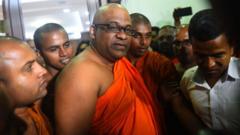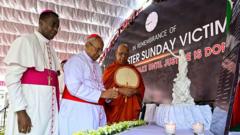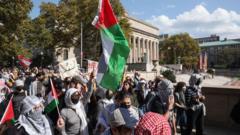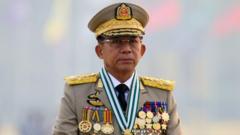Galagodaatte Gnanasara, a prominent Buddhist monk and nationalist in Sri Lanka, has been sentenced to nine months in prison for insulting Islam and inciting religious hatred, a ruling that underscores the ongoing challenges of religious coexistence in the country. Initially convicted on remarks made in 2016, this latest sentence marks a significant legal precedent in a nation where Buddhist monks are seldom held accountable for hate speech.
Buddhist Nationalist Monk Sentenced for Insulting Islam and Inciting Hatred

Buddhist Nationalist Monk Sentenced for Insulting Islam and Inciting Hatred
Galagodaatte Gnanasara, a controversial figure in Sri Lankan politics, is jailed for a hate speech conviction amidst a backdrop of religious tensions.
Gnanasara, an erstwhile ally of ousted former president Gotabaya Rajapaksa, has a storied history of invoking religious nationalism and facing accusations of hate crimes, particularly against the Muslim community in Sri Lanka. His latest conviction was handed down by the Colombo Magistrate's Court, which noted the Constitutional right to freedom of belief for all citizens, regardless of their faith. Alongside his prison term, Gnanasara was also fined 1,500 Sri Lankan rupees (approximately $5) with the caveat that failure to pay would extend his incarceration by a month.
This ruling follows a presidential pardon he received in 2019 for earlier convictions related to contempt of court and intimidation. His most recent incarceration reflects a broader narrative of political and social upheaval in Sri Lanka, particularly after Rajapaksa's resignation amid nationwide protests fueled by economic distress.
Gnanasara's past includes a prior sentence for hate speech directed at Muslims, for which he was released on bail while appealing against a four-year sentence. His notoriety is further amplified by his leadership of a Sinhalese Buddhist nationalist group, emblematic of the ethnic and religious divisions that still challenge Sri Lanka. The court dismissed his lawyers' request for bail during his appeal process, solidifying his current custodial status.
The history of Gnanasara illustrates the intertwined pathways of religion, politics, and law in Sri Lanka, as the situation continues to evolve against a backdrop of economic challenges and social unrest.
This ruling follows a presidential pardon he received in 2019 for earlier convictions related to contempt of court and intimidation. His most recent incarceration reflects a broader narrative of political and social upheaval in Sri Lanka, particularly after Rajapaksa's resignation amid nationwide protests fueled by economic distress.
Gnanasara's past includes a prior sentence for hate speech directed at Muslims, for which he was released on bail while appealing against a four-year sentence. His notoriety is further amplified by his leadership of a Sinhalese Buddhist nationalist group, emblematic of the ethnic and religious divisions that still challenge Sri Lanka. The court dismissed his lawyers' request for bail during his appeal process, solidifying his current custodial status.
The history of Gnanasara illustrates the intertwined pathways of religion, politics, and law in Sri Lanka, as the situation continues to evolve against a backdrop of economic challenges and social unrest.




















